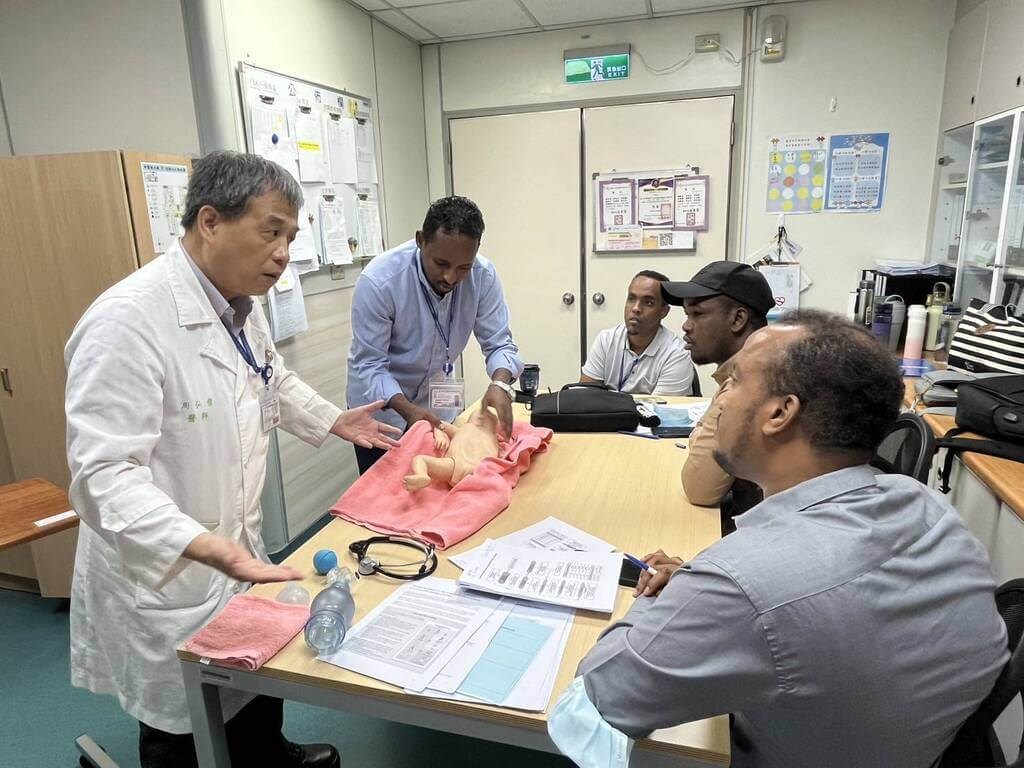Taipei, April 8 (CNA) Eight physicians from Somaliland are working to improve emergency care for patients in their home country after receiving training in Taiwan, with one of them telling CNA he wants to promote CPR to challenge the misconception back home that cardiac arrest is untreatable.
“Many people [in Somaliland], including healthcare workers, do not recognize the importance of immediate CPR (cardiopulmonary resuscitation) in saving lives,” Eid Abdi Ahmed, one of the eight physicians from the African country who received training in Taiwan last year, told CNA in a recent written interview.
“Some believe that cardiac arrest means inevitable death, and CPR is seen as futile,” Ahmed added.
After receiving two months of training at the Yunlin branch of National Taiwan University Hospital in mid-2024, he and his colleagues found that healthcare workers and members of the public in Taiwan take a completely different approach to CPR and Basic Life Support (BLS).
“The most impressive aspect of my training in Taiwan was the highly systematic and team-based approach to emergency care,” Ahmed said, adding that emergency medicine in his motherland still has a “significant gap” when it comes to implementing standardized life-saving protocols.
“Many healthcare providers [in Somaliland] lack formal training in emergency response, particularly in critical areas like cardiac arrest management,” said Eid Abdi Ahmed, who primarily took courses in Advanced Cardiac Life Support (ACLS) during his time in Taiwan.
He was also struck by the large number of automated external defibrillators (AEDs) available in public spaces across Taiwan, as well as “widespread public awareness” of BLS — something he believes can significantly increase bystander CPR rates.
“Few medical professionals [in Somaliland] are formally trained in CPR, and bystander CPR is almost non-existent,” he added.
Ahmed said he hopes to introduce simulation-based training and standardized emergency response teams in Somaliland, after observing Taiwan’s structured ACLS protocols — where each team member has a clearly defined role — and advanced simulation exercises that prepare medical staff for high-stress scenarios.
After sharing his experience in Taiwan, Ahmed said his colleagues in Somaliland responded with great enthusiasm.
He noted that many were “surprised” by the effectiveness of Taiwan’s structured emergency teams, the high cardiac arrest survival rates due to immediate CPR and defibrillation, and the use of simulation-based training methods, which they now hope to adopt.
Under the “Public Health Emergency Response System Enhancement Project in Somaliland,” launched by Taiwan’s International Cooperation and Development Fund (TaiwanICDF), eight physicians from Somaliland were invited to Taiwan for medical training last year.
Ahmed and three others received training in ACLS, while the remaining four focused on Prehospital Emergency Care (PEC).
Project manager Fan Chen-hua (范震華), who is currently based in the African country, shared with CNA one of the most noticeable changes since the implementation of the two-year project on Jan. 1, 2024
“Local medical personnel originally did not perform resuscitation on patients who had lost their heartbeat and stopped breathing … but following the introduction of our project, some have gradually started doing so,” he said.
“We’ve planted many seeds through this project, and they are now gradually beginning to take root and grow,” Fan added.
In addition to inviting local physicians to receive training in Taiwan, the project also provides on-site training for healthcare workers in Somaliland’s Hargeisa and Gabiley districts, according to Fan.
If training in those two areas is completed ahead of schedule, emergency medical personnel from other regions will also be invited to take part, he said.
“In the spirit of bilateral cooperation, we also encourage the Somaliland government to develop its own initiatives — we cannot let our partner country see us as the only solution,” Fan added.
Somaliland, located in the Horn of Africa, declared independence from Somalia in 1991 and has functioned as a de facto sovereign state ever since, but is not officially recognized by any other country.
Ties between Taiwan and Somaliland have warmed since the two sides set up representative offices in each other’s capitals in 2020.
